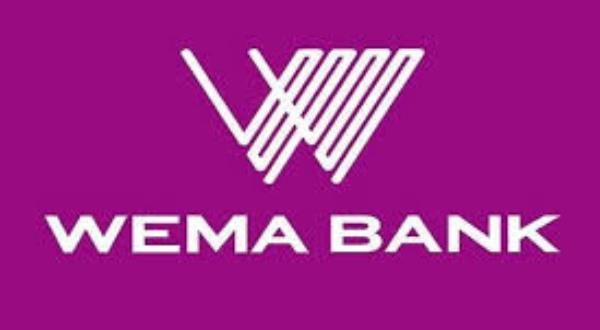E-Financial
Wema Bank Records Impressive Financial Performance in 2022 Half-Year Reports

Wema Bank Plc, pioneer of Africa’s first fully digital bank and one of Nigeria’s most resilient banks, has posted a growth performance across all financial indices in the First-Half of its 2022 operations.

This information is contained in the Financial Results for the Period Ended 30 June, 2022 released in Lagos on 28 July, 2022.
In the report, the bank recorded an increase of 50 percent in its Gross Earnings from the ₦39.82 billion it recorded in H1 of 2021 to ₦59.59 billion. It also grew its Interest Income by 55 percent year-on-year, from the ₦32.19 billion recorded at this period last year to ₦49.75 billion.
The bank’s Non-Interest Income went up from ₦7.64 billion in the period ended 30 June, 2021 to ₦9.85 billion, an increase of 29 percent.
Similarly, Wema Bank recorded a 43 percent increase in Profit before tax (PBT) from ₦4.30 billion over the same period last year to ₦6.13 billion for the period under review. The bank’s Profit after tax (PAT) also increased from ₦3.72 billion in H1 2021 to ₦5.30 billion reflecting a raise of 42 percent.
The bank also grew its deposit by 43 percent from ₦968.17 billion reported in FY 2021 to ₦1.09 trillion in the H1 2022. It also grew its loans and advances from ₦418.86 billion to ₦447.23b in H1 2022, an increase of seven percent.
Ademola Adebise, the Managing Director/Chief Executive officer of the bank, attributed the remarkable performance to increased customer satisfaction the bank delivers through its investment in technology.
“Our performance has shown strong and promising results in the second quarter. Customers have continually shown trust in our proficiency, innovation, and service delivery even as the market gets more challenging.
“That said, I am confident, that despite increased volatility and uncertainty, we will continue to scale up, manoeuvre the environment, creatively manage our resources, and drive long-term, substantial returns for shareholders.”
In his own remarks, the bank’s Chief Finance Officer, Mr. Tunde Mabawonku, explained that the strong performance stems from the bank’s diversification of its business and value derived from its digital assets.
“This has been a strong first half with Interest Income up 55% and Profit Before Tax up 43% compared to H1 2021.” Mabawonku said.
“This strong showing is down to diversification at different levels of our businesses. Also, it is a testament to the advantage of our investment in digital banking assets which have continued to boost customer satisfaction and build trust for us. Also, we are aware of the challenges that the rising cost of living is having on our customers and stakeholders.
“Given the size of our balance sheet and income growth, we have trust in our ability to continue to provide support and help cushion the impact of growing costs in the market,” he explained.
E-Financial
FG to Train 100,000 Youths Annually in Forex Trading and Financial Skills

Federal Government of Nigeria has signed a Memorandum of Understanding (MoU) with Investonaire Academy to train 100,000 young Nigerians annually in forex trading, financial planning, and risk management.

The agreement, signed in Abuja, was announced by Omolara Esan, Director of Information and Public Relations at the Federal Ministry of Youth Development. According to her, the initiative is part of the government’s broader strategy to reduce youth unemployment and enhance financial inclusion.
At the signing ceremony, Minister of Youth Development, Comrade Ayodele Olawande, described the partnership as a milestone in the ministry’s efforts to equip young Nigerians with practical financial skills. He emphasized that the programme would foster critical thinking, improve digital literacy, and expand access to global economic opportunities.
Speaking on the collaboration, Dr. Enefola Odiba, International Programme Director at Investonaire Academy, highlighted the importance of empowering youth with relevant financial and digital skills. He described young people as essential drivers of innovation and national development.
The ministry assured that the programme would be implemented with transparency and measurable outcomes, ensuring that participants gain practical expertise in forex trading and financial planning.
The Federal Government has recently intensified efforts to boost skill development across various sectors. A separate plan aims to train 100,000 artisans nationwide, following the successful upskilling of 29,000 individuals in previous phases. This initiative seeks to professionalize vocational trades, eliminate quackery, and introduce licensing systems.
Additionally, technicians from specialized institutions will receive industry-standard training to strengthen Nigeria’s labor force and increase self-reliance in skilled professions.
Through these efforts, the government hopes to position Nigerian youth for economic success both locally and globally.
E-Financial
NDIC Begins Final Settlements to Creditors of Liquidated Premier Bank

Nigeria Deposit Insurance Corporation (NDIC) has begun the final phase of liquidation for the defunct Premier Commercial Bank, initiating the payment of liquidation dividends to verified creditors, nearly 25 years after the bank’s closure.

Premier Commercial Bank had its operating license revoked by the Central Bank of Nigeria (CBN) on December 20, 2000, following findings of financial instability and regulatory non-compliance.
Since then, the NDIC has overseen the bank’s liquidation process under a winding-up order from the Federal High Court, which designated the corporation as the official liquidator.
In a public announcement, the NDIC invited all eligible creditors to visit any of its zonal offices between June 2 and June 27, 2025, to verify and claim their entitlements.
This move marks a critical milestone in the final settlement of claims related to the bank’s collapse.
To facilitate the verification process, creditors are required to present proof of deposit or shareholding, such as a passbook, chequebook, term deposit certificate, or bank statement.
Additionally, valid identification documents must be submitted, including a driver’s license, international passport, national identity card, NIN slip/card, voter’s card, or a formal identification letter from a traditional ruler or local government chairman.
The NDIC assured the public that the ongoing settlement is part of a broader effort to bring closure to longstanding claims resulting from Premier Commercial Bank’s liquidation. The process, according to the corporation, has been designed to ensure efficient disbursement to all verified stakeholders.
Premier Commercial Bank is one of 53 deposit money banks whose licenses were revoked by the CBN between 1994 and 2018 due to various violations and signs of financial distress.
These closures were followed by legal procedures appointing the NDIC to manage asset recoveries and creditor settlements.
By initiating this final phase of payment, the NDIC is reaffirming its commitment to financial system stability and depositor protection while calling on all affected individuals and institutions to complete verification processes promptly to receive their due compensation.
E-Financial
SEC Directs Companies to Honour Unclaimed Dividend Requests

Securities and Exchange Commission (SEC) has directed all public companies and Registrars to stop treating unclaimed dividends older than 12 years as “statute-barred”, especially those dating from before the enactment of the Finance Act 2020.

The directive reaffirms the provisions of Section 60 of the Finance Act, which mandates that dividends unclaimed for over six years be transferred to the Unclaimed Funds Trust Fund (UFTF), where they remain accessible to shareholders pending claims.
The Commission said that shareholders are entitled to continue to claim their dividends that are not statute-barred (that is not above 12 years) before December 31, 2020 “when the Finance Act 2020, came into effect.”
According to the SEC in a Circular, “The attention of the Securities and Exchange Commission has been drawn to the fact that paying companies and their Registrars have continued to treat unclaimed dividends of public companies that are older than 12 years as being “statute-barred” without recourse to the provisions of the Finance Act 2020.
“In response to various inquiries on the subject, the Commission hereby clarifies as follows: The import of the provisions of Section 60 of the Finance Act 2020 (December 31, 2020), is that, where dividends declared by a public company quoted on the Nigerian Exchange Limited remained unclaimed for a period of six years or more, such dividends are expected to be transferred to the Unclaimed Funds Trust Fund (UFTF) to be held in trust and managed pending when the shareholder presents a claim for such unclaimed dividends.
“Pending the setting up and operationalisation of the UFTF by the Federal Government, pursuant to its powers under Sections 3 (4) (e) and 93 of the Investments and Securities Act 2025, the Commission hereby directs public companies and their Registrars to continue to honour all requests by shareholders for the payment of unclaimed dividends as described above, with effect from December 31, 2020”.
The Commission therefore directed public companies and Registrars to effect immediate compliance with the directive and submit periodic reports on same in the manner prescribed in the Commission’s Rules and Regulations.

 News2 days ago
News2 days agoCDCFIB Warns against Recruitment Racketeers

 Telecom2 days ago
Telecom2 days agoMeta, FMCIDE Unveil AI Accelerator to Drive Innovation in Nigeria

 News2 days ago
News2 days agoFG May Forfeits $4m from World Bank Loan over Audit Flop

 Telecom2 days ago
Telecom2 days agoNigeria Leads the Charge in Green Innovation @MTN’s Africa PachiPanda Challenge

 Broadcasting2 days ago
Broadcasting2 days agoAfia TV and Radio Stamps Footprints in Lagos

 Telecom1 day ago
Telecom1 day agongCERT Issues High Alert to Nigerians Using Android Phones

 E-Financial2 days ago
E-Financial2 days agoNDIC Begins Final Settlements to Creditors of Liquidated Premier Bank

 News2 days ago
News2 days agoConcerned Nigerians Ask EFCC to Release Abiodun, CBEX Promoter




























